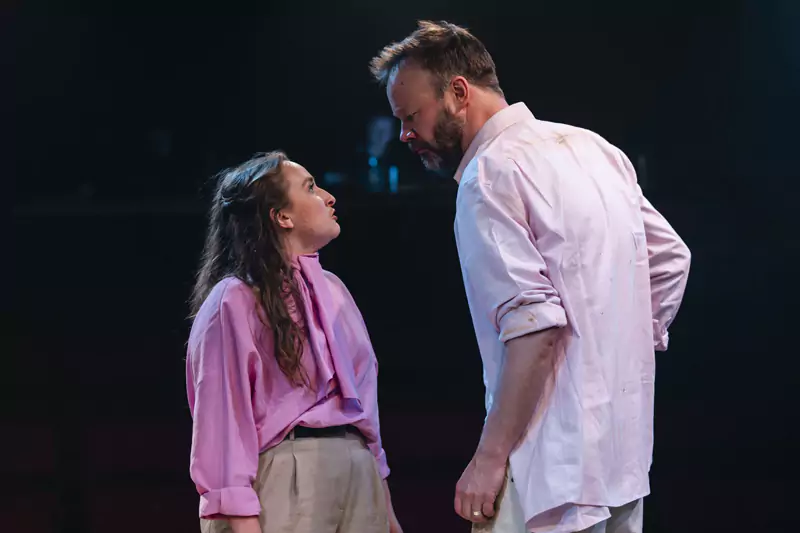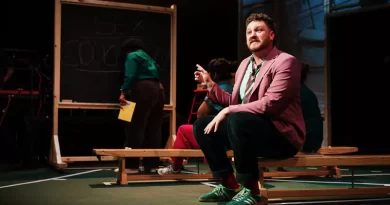“The Winter’s Tale” at Tobacco Factory, Bristol
Simon Thomas in South West England
28 February 2025
In only her second production as Artistic Director of Tobacco Factory Theatres, Heidi Vaughan pulls together a talented local cast, all living within 25 miles of Bristol. It’s the venue’s first home-produced show in over a year and their biggest venture since the pandemic.

Genevieve Sabherwal and Jacob Aldcroft.
Photo credit: Charlie Swinbourne.
Vaughan clearly knows her Shakespeare with an intelligent, incisive staging and uniformly excellent performances. Felix Hayes has much experience, including spells at the RSC, to bring to the demanding role of Leontes, the king who loses his reason from a germ of suspicion planted by his wife’s simple goodwill towards a rival king. There’s no “putter-on” here, no Iago to drive him to a raging jealousy; the poison wells up in him almost unprompted and the difficulty of the role is that he is plunged into madness from the off. Hayes’ king is clearly in the depth of a major mental catastrophe and he sustains the tension throughout the punishing first three acts.
Alice Barclay is excellent as his misused Queen, Hermione, as is Bill Ward as the falsely suspected adulterer and betrayer of Leontes’ trust, Polixenes. There is irony in his own slide into tyranny later in the play when he attempts to tear apart the blossoming romance of his son Florizel (Jacob Aldcroft), smitten with a seeming shepherdess who we, the audience, know is the lost Princess Perdita (Genevieve Sabherwal). His threats towards her are as vicious and cruel as those that Leontes metes out to Hermione and her new-born child, and all the more shocking coming from a supposed innocent.
Rose Wardlaw is a fiery and superbly acted Paulina, the wily stage manager of the play’s denouement, and Amy Loughton impresses as the (Welsh) shepherd who brings up Perdita. The broadest comedy moments go to Corrina Buchan’s Scottish clown and Stu McLoughlin’s guitar-toting Autolycus. Dorian Simpson is a sympathetic Camillo, the faithful and principled courtier who yearns to go home. All actors double parts, even Hayes who pops up as the chorus Time at the beginning of the second half, but the clarity of the direction and acting avoids any confusion over who is who.

Rose Wardlaw and Felix Hayes.
Photo credit: Charlie Swinbourne.
There are moments of theatrical magic such as the sudden hauling of a white curtain across the acting area, cutting the auditorium in two and allowing the storm and that most memorable of Shakespeare’s stage directions “Exit, pursued by a bear” to be acted out in silhouette. Vaughan’s direction takes full account of the demands of a fully in-the-round staging, which keeps settings to a minimum, a trucking hunk of log and a pile of cushions dressing the action (design by Edwina Bridgeman). Costumes are rather from the budget box but resources have been directed to what’s most important.
It’s often said that The Winter’s Tale is two plays in one: an intense psychological drama for three acts, followed by a knockabout comedy in the pastoral tradition, the two genres coming together for a sombre but uplifting finale. It’s no fault of the company that the comedy scenes are somewhat laboured. The cast work hard to overcome the thin material of clowning rustics with a range of comedy accents and some neat comedic flourishes but the more serious business is welcome back in the final scenes.
The final act, in which the long-dead Hermione is magicked back to life, is strewn with dangers due to the sheer artifice of the situation but when effectively staged, as here, is one of the most touching scenes in all Shakespeare. Vaughan’s production does not fail in bringing a lump to the throat, as the themes of forgiveness and redemption are played out in the bitter-sweet ending. Couples are finally united but there has been a massive cost in the loss of both Leontes and Hermione’s young son Mamillius and 16 years of happiness.
The text is trimmed by Robin Belfield to give a pacy running time of two and a quarter hours. We do not see Mamillius on stage, maybe losing some of the impact of his premature death, while the reporting of events in the final act (a dialogue between gentlemen of the court in the full text) is skilfully distilled into a monologue for Autolycus.
This hugely enjoyable evening bodes well for the future of the Tobacco Factory and the next home-grown production can’t be too soon in coming.









